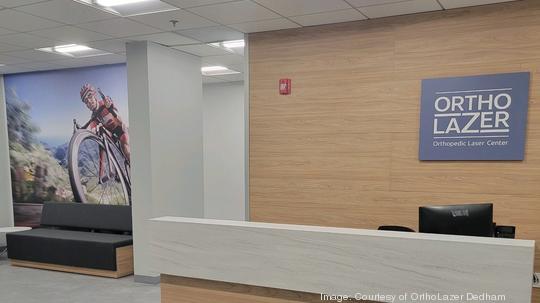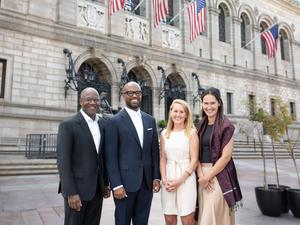
Dr. Scott Sigman, an orthopedic surgeon and sports medicine specialist who practices in North Chelmsford, has been on a mission for the last decade to find alternatives to opioids for pain management.
In 2012, he remembers that five high schoolers in Andover died of opioid-related overdoses. He and his wife, a florist in the town, helped make the flower arrangements for the funerals.
“It was a very, very sad time as we were putting together the flowers and arranging for these funerals and it just really struck home that what we were currently doing was not working and we needed to come up with a new solution,” Sigman said. Sigman is the former chief of orthopedics at Lowell General Hospital and also served on one of the state’s three Opioid Special Commissions.
Through several years of research and testing, Sigman focused on the practice of using lasers to help patients manage pain and inflammation without prescribing opioids. In 2019, Sigman founded OrthoLazer Orthopedic Laser Centers and began opening locations across the country, starting with Chelmsford. The company, which is headquartered in Rochester, New York, recently opened its second Massachusetts location in Dedham.
The laser the centers use is called the MLS M8 Robotic Laser and is FDA cleared. Sigman said the laser is all about emitting specific wavelengths of light energy into the body.
“If you shine the right wavelength of light down to the cells, the cell creates a new sort of reaction. It changes the milieu or the environment around the cell,” Sigman said.
As a result of the laser treatment, Sigman said a cell will increase its production of ATP to boost its metabolism, send out proteins that trigger an increased vascular blood flow and stimulate the fibroblasts, or healing cells, of the body.
Sigman said these lasers have several uses. They can be used for acute injuries, such as a rolled ankle, to turn off the inflammatory response that creates swelling and pain. It can also be used post-surgery to help with pain and reduce the need for opioids while recovering, which is often when opioids are prescribed. Lasers can also help people with chronic conditions like arthritis or tendonitis. Lasers cannot be used on cancer sites in the body, Sigman said, or on people with blood-borne cancers.
Patients cannot feel, see or hear the laser, Sigman said. A single treatment takes about 15 minutes. He said patients with acute injuries usually need six visits for the impacts to build up at the cellular level. Chronic pain patients might need more like 12 appointments.
These laser treatments are not currently covered by insurance. The average charge for a single appointment at OrthoLazer Centers is $70, Sigman said.
“We would love to have insurance pay for it. But unfortunately, the process of getting Medicare or commercial payors to pay for things like this is a very complex, very expensive and long process,” Sigman said. “Not to say that we aren’t going to do that, and there potentially are plans for that, but as of right now, there are no insurance companies that will pay for the laser.”
Sigman said communicating to patients and doctors about the safety and efficacy of lasers has not been easy. They are not broadly known as a treatment option.
But, he said, lasers have made some recent progress in gaining attention and credibility from medical groups. The American Academy of Orthopedic Surgery recently updated its guidelines for treating knee arthritis and included lasers in its list of alternative treatments, Sigman said. The CDC also named lasers as an alternative treatment option to opioids for pain management.
“You got a couple of really major regulatory bodies come through and recognize the potential for the use of laser for pain and inflammation,” Sigman said.
Sigman said the challenge now is increasing accessibility of laser treatments.
OrthoLazer Centers has 14 centers open and 25 more in the queue, Sigman said. A Wellesley location is scheduled to open in April. The OrthoLazer Dedham and Wellesley locations are co-owned by managing partners Brian Hall and Dr. Bob Patz, former president of the Massachusetts Orthopedic Association.








